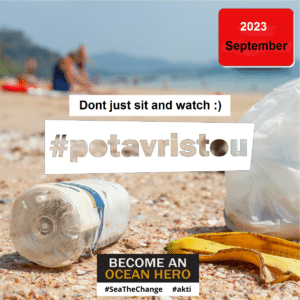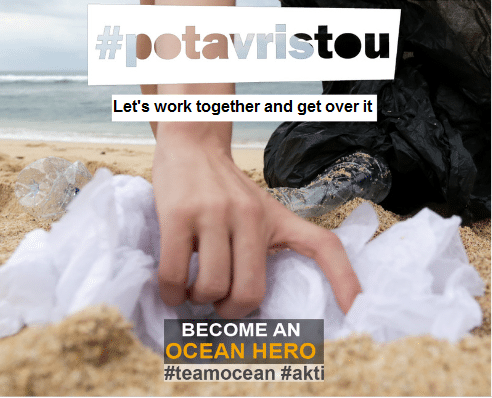By Xenia Loizidou
September is the month of #potavristou! Every year since September of 2019, AKTI organises the action #potavristou.
It’s simple: every person or friend group can reach out, wherever they are, pick up the rubbish that lies around them, count it and send a message to AKTI’s social media, including the data and pictures, they can also upload the pictures on their own social media accounts and write #potavristou, #akti, #SeaTheChange on the post’s description.
#potavristou is a typical citizens science action, where citizens become part of science by providing valuable field data, following guidelines on how to report them using the familiar tools of social media.
The data are analysed by AKTI’s scientists. The results reveal truths on litter, eg they address the litter with the highest frequency, providing thus, decision makers with the science based policy tools to guide on which they can base their decisions on which policies and practices to support and implement in order to combat littering.
From previous years we know that the 86 per cent of collected litter through #potavristou is plastic.
During September, AKTI’s staff support citizens groups that organise clean ups, schools, local authorities and companies, by participating in their events, discussing the issues of microplastics, the impacts of marine litter on marine life, on public health etc. Best practices and examples of effective marine litter management are presented through a dedicated social media campaign, as a tool for capacity building and a source of inspiration. Through #potavristou, we demonstrate the effects of interactive processes and of active involvement of citizens in the research effort (i.e hands-on data capture and reporting them through social media).
The implementation of the goals of the Honolulu Strategy, formulated during the Fifth International Marine Debris Conference (5IMDC) in March 2011, is a significant step in this direction.
The Honolulu Strategy is a global framework for concerted actions, bringing together all the stakeholders, to address marine litter through the implementation of three goals and associated strategies.

The EU’s Action Plan for a Circular Economy lays the foundation to a new global economy that will move away from a make-use-discard model to one where waste becomes a resource.
Market-based instruments, such as deposit refund schemes (DRS), can lead to a reduction of littering, reaching up to 90 per cent of minimisation of plastic, metal and Tetra Pak that are found in nature, for example in Malta.
In Cyprus the implementation of DRS is pending for the last five years.
The lack of civil society’s involvement in policy/ decision making and also in volunteering activities has not been so far systematically addressed in Cyprus.
Activities such as #potavristou that promote voluntarism, citizens science and self-action (not only participation in organised events, but spontaneous care for a clean environment) are important actions to promotesparticipation and engagement.
The increase in the number of volunteers joining #potavristou confirms the positive effect. In the past four years of #potavristou, 7772 volunteers participated, from 843 locations in Cyprus and 155 locations abroad, collecting 47 tons of garbage, 86 per cent of which is plastic.
This huge amount of trash would be out in nature, soon starting to decompose and returning “vengefully” back to us in the form of microplastics. From the very first year #potavristou received lots of international attention for its originality and received many international awards (eg awarded by the Ocean Conservancy in 2020 for innovation and received the Carob award of 2022, for a successful social media campaign).
This year we want to break last year’s record! The results until now are amazing! Join us!
How to participate in #potavristou with four simple steps:
- Wherever you are: on the mountains, at the beach, in a park or even in a field, in the city or in a village, #potavristou, reach out and pick up as much trash as you can,
- Count the trash you have collected: eg number of plastic bottles, number of cups, number of cigarette buds etc,
- Take a picture,
- Upload the picture on Facebook/Instagram and include #potavristou, #teamocean and #akti, together with the data and results of the clean up, the location and the participants.
(In case your Instagram account is private, make the post on Facebook instead and tag AKTI, or text us on messenger).
What will you do with the collected trash?
- Take the trash with you. Do not leave collected trash in remote areas, even in bags. They will end up in nature again
- If you plan to collect big amount of trash and you cannot take it with you, contact some days before the nearest municipality and they will help you out,
- If you are on a boat, bring the trash out!
- If possible, try to separate the trash and throw it in recycling bins (many PMD bins can be found).
For more information visit:
https://www.facebook.com/akti.cy
https://www.instagram.com/akti_ngo/
22458485 (Giannis Loizides)
Dr Xenia I. Loizidou is a civil and coastal engineer. For 30 years she has worked in more than 50 countries as a researcher and expert in the fields of natural systems management, coastal and marine environment, climate change and sustainable development strategies







Click here to change your cookie preferences